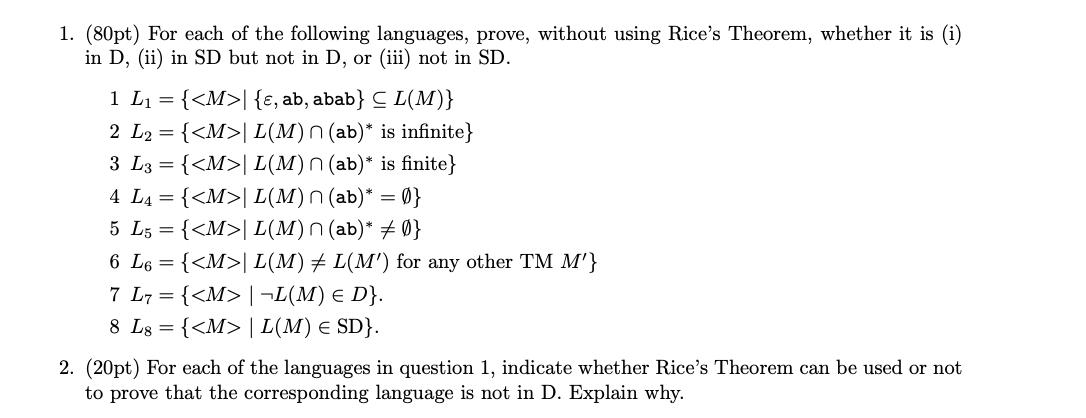Question
1. (80pt) For each of the following languages, prove, without using Rice's Theorem, whether it is (i) in D, (ii) in SD but not

1. (80pt) For each of the following languages, prove, without using Rice's Theorem, whether it is (i) in D, (ii) in SD but not in D, or (iii) not in SD. 1 L = { | {, ab, abab} CL(M)} 2 L2 = { | L(M) 3 L3 = { | L(M) (ab)* is infinite} (ab)* is finite} 4 L = { | L(M) n (ab)* = 0} 5 L5 = { |L(M) n (ab)* 0} 6 L6 = { | L(M) L(M') for any other TM M'} 7 L7 = { |L(M) D}. 8 L8 = { | L(M) SD}. 2. (20pt) For each of the languages in question 1, indicate whether Rice's Theorem can be used or not to prove that the corresponding language is not in D. Explain why.
Step by Step Solution
There are 3 Steps involved in it
Step: 1

Get Instant Access to Expert-Tailored Solutions
See step-by-step solutions with expert insights and AI powered tools for academic success
Step: 2

Step: 3

Ace Your Homework with AI
Get the answers you need in no time with our AI-driven, step-by-step assistance
Get StartedRecommended Textbook for
Applied Linear Algebra
Authors: Peter J. Olver, Cheri Shakiban
1st edition
131473824, 978-0131473829
Students also viewed these Programming questions
Question
Answered: 1 week ago
Question
Answered: 1 week ago
Question
Answered: 1 week ago
Question
Answered: 1 week ago
Question
Answered: 1 week ago
Question
Answered: 1 week ago
Question
Answered: 1 week ago
Question
Answered: 1 week ago
Question
Answered: 1 week ago
Question
Answered: 1 week ago
Question
Answered: 1 week ago
Question
Answered: 1 week ago
Question
Answered: 1 week ago
Question
Answered: 1 week ago
Question
Answered: 1 week ago
Question
Answered: 1 week ago
Question
Answered: 1 week ago
Question
Answered: 1 week ago
Question
Answered: 1 week ago
Question
Answered: 1 week ago
Question
Answered: 1 week ago
Question
Answered: 1 week ago
Question
Answered: 1 week ago
Question
Answered: 1 week ago
View Answer in SolutionInn App



